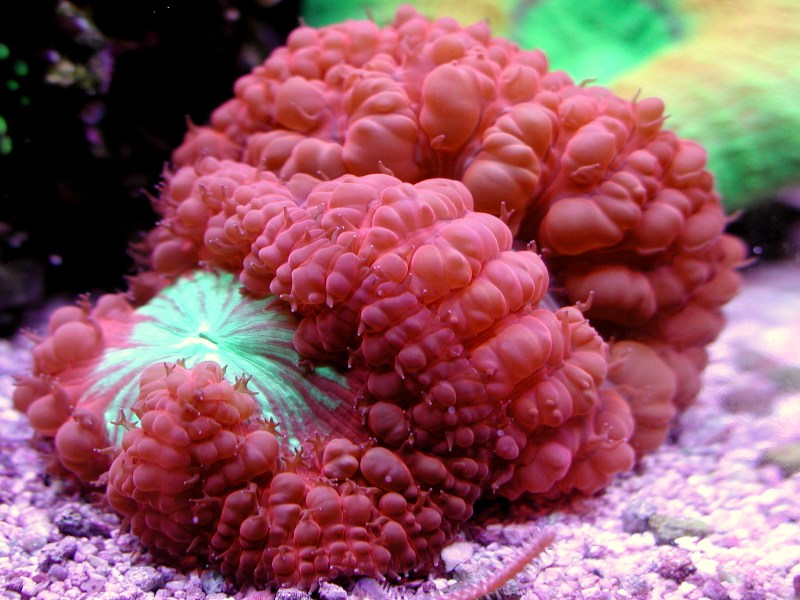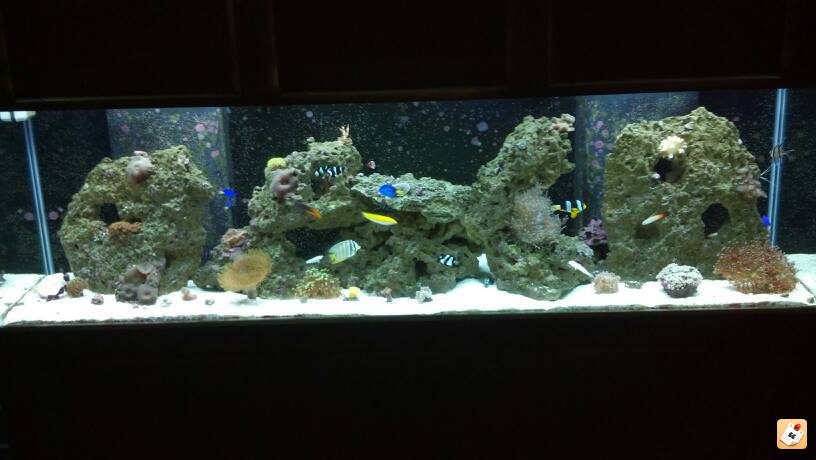Feed like a geek...Your reef will LOVE you for it!
As you know, when I'm not stoking fellow reefers with cool corals, I get to travel around the country and talk about geeky reef topics. One of my most in-demand topics is "Nutrient Control and Export", which, in other words, is a nice way of saying "Getting the nasty stuff out of your aquarium."
I'm compelled to touch on this today (nutrient CONTROL) because of a (very) long phone call with a reefer yesterday about the crazy algae bloom his 225 reef is enduring. When we got down to the nitty-gritty, it turned out he had accumulated a few bad habits, one of which specifically led to his algae issues without a doubt: Sloppy feeding!
Obviously, you've heard me rant about water changes and why I think they are so great, so I'm not going to touch on them today. Rather, I'm going to focus very succinctly on one of the easiest ways to PREVENT problems in the first place: feeding carefully. Let me clarify one thing...in our commercial operation, we are dumping significant food inputs into our raceways, but we are also changing large quantities of water on a weekly basis. We are careful about how we feed, administering the food and not the fluids that it's contained in whenever possible. You should do this, too.

One of the easiest to control sources of excess nutrients in captive systems is food. Frozen and other prepared foods contain large quantities of phosphate and other organics that can seriously degrade the water quality in even the largest aquariums. When feeding frozen foods, it is of utmost importance that you do not simply dump the food, frozen juices and all, directly into your aquarium. The processing juices contain huge amounts of nutrients that may not be utilized by the life forms in your aquarium, and thus accumulate, creating optimal conditions for...nuisance algae. And we've all been guilty of this bad habit - we're too busy living our regular lives, and it's easy to just "toss a few cubes" in the tank on our way out the door.
Bad practice. Think about it. A lot of the juice in frozen foods (and for that matter, a lot of the food itself) simply goes right down your overflow or into the substrate, where it can accumulate to feed algae blooms! Bad news.
My solution: Always thaw out frozen foods slowly in a container of water, then dump out the water, and feed the food with a toothpick or other small implement. Or, thaw out the food in a container, then pour into a fine mesh net and rinse before dispensing into the aquarium. Yes, this technique is a bit more tedious, but it will significantly reduce the amount of excess organics that enter the aquarium. It is a basic tenant of aquarium keeping that you should only feed as much food as your fishes will consume in a reasonable length of time, and that uneaten food should be removed before it has a chance to decompose and affect water quality.
This may seem alternately like either a pain in the rear, or a stupidly easy concept. Yes, it's a bit slower than just dumping the food in the tank, but you'll have way more control over what is going in to your tank! The thing is, if you develop a good feeding "protocol", it's one less thing you have to consider when these nuisance algae issues occur.
When utilizing liquid foods, such as those developed for invertebrates, be sure to use a syringe or baster to “target feed†the animals. Shut off the flow in your system while feeding, to at least give yourself a "fighting chance" of getting the food where it belongs! Some hobbyists actually remove animals such as Tubastrea, and even small clams, to a separate container to allow them to feed without fear of polluting the display tank.This is a super effective technique for nano tanks, where small variations in water quality are a major issue.
All that handling may or may not be bad for some animals, but I can tell you that I've done this with nano tanks and it made a huge difference in water quality and the overall health of my coral. And, in the end, the coral did not have any issues with regular "handling", much to my delight. The extra time it takes to do this can reward the diligent aquarist with much higher water quality, and less possibility of nuisance algae appearing in the display tank...or even your 1,200 gallon propagation raceways!

Bottom line is this: You'll never be hurting your reef if you embrace a more careful feeding technique! Anything you can do to waste less food and get it into the mouths of the animals instead of your sanded, sump, or filter pads is a good investment of reef time and energy! Your diligence will be rewarded with a healthier, more vibrant reef with thriving, colorful corals!


What is your favorite feeding technique? I'm also curious how often you're feeding your reefs, and with what foods. As a propagator, it's always interesting for us to hear what types of care our customers provide the animals when they receive them. If we align our protocols similar to what the corals receive in their owners' care (or vice-versa) , we can probably all benefit from this shared knowledge!
Anyways, as always- keep the dialogue open! Let's learn from each other!
Scott Fellman
Unique Corals
As you know, when I'm not stoking fellow reefers with cool corals, I get to travel around the country and talk about geeky reef topics. One of my most in-demand topics is "Nutrient Control and Export", which, in other words, is a nice way of saying "Getting the nasty stuff out of your aquarium."
I'm compelled to touch on this today (nutrient CONTROL) because of a (very) long phone call with a reefer yesterday about the crazy algae bloom his 225 reef is enduring. When we got down to the nitty-gritty, it turned out he had accumulated a few bad habits, one of which specifically led to his algae issues without a doubt: Sloppy feeding!
Obviously, you've heard me rant about water changes and why I think they are so great, so I'm not going to touch on them today. Rather, I'm going to focus very succinctly on one of the easiest ways to PREVENT problems in the first place: feeding carefully. Let me clarify one thing...in our commercial operation, we are dumping significant food inputs into our raceways, but we are also changing large quantities of water on a weekly basis. We are careful about how we feed, administering the food and not the fluids that it's contained in whenever possible. You should do this, too.
One of the easiest to control sources of excess nutrients in captive systems is food. Frozen and other prepared foods contain large quantities of phosphate and other organics that can seriously degrade the water quality in even the largest aquariums. When feeding frozen foods, it is of utmost importance that you do not simply dump the food, frozen juices and all, directly into your aquarium. The processing juices contain huge amounts of nutrients that may not be utilized by the life forms in your aquarium, and thus accumulate, creating optimal conditions for...nuisance algae. And we've all been guilty of this bad habit - we're too busy living our regular lives, and it's easy to just "toss a few cubes" in the tank on our way out the door.
Bad practice. Think about it. A lot of the juice in frozen foods (and for that matter, a lot of the food itself) simply goes right down your overflow or into the substrate, where it can accumulate to feed algae blooms! Bad news.
My solution: Always thaw out frozen foods slowly in a container of water, then dump out the water, and feed the food with a toothpick or other small implement. Or, thaw out the food in a container, then pour into a fine mesh net and rinse before dispensing into the aquarium. Yes, this technique is a bit more tedious, but it will significantly reduce the amount of excess organics that enter the aquarium. It is a basic tenant of aquarium keeping that you should only feed as much food as your fishes will consume in a reasonable length of time, and that uneaten food should be removed before it has a chance to decompose and affect water quality.
This may seem alternately like either a pain in the rear, or a stupidly easy concept. Yes, it's a bit slower than just dumping the food in the tank, but you'll have way more control over what is going in to your tank! The thing is, if you develop a good feeding "protocol", it's one less thing you have to consider when these nuisance algae issues occur.
When utilizing liquid foods, such as those developed for invertebrates, be sure to use a syringe or baster to “target feed†the animals. Shut off the flow in your system while feeding, to at least give yourself a "fighting chance" of getting the food where it belongs! Some hobbyists actually remove animals such as Tubastrea, and even small clams, to a separate container to allow them to feed without fear of polluting the display tank.This is a super effective technique for nano tanks, where small variations in water quality are a major issue.
All that handling may or may not be bad for some animals, but I can tell you that I've done this with nano tanks and it made a huge difference in water quality and the overall health of my coral. And, in the end, the coral did not have any issues with regular "handling", much to my delight. The extra time it takes to do this can reward the diligent aquarist with much higher water quality, and less possibility of nuisance algae appearing in the display tank...or even your 1,200 gallon propagation raceways!
Bottom line is this: You'll never be hurting your reef if you embrace a more careful feeding technique! Anything you can do to waste less food and get it into the mouths of the animals instead of your sanded, sump, or filter pads is a good investment of reef time and energy! Your diligence will be rewarded with a healthier, more vibrant reef with thriving, colorful corals!
What is your favorite feeding technique? I'm also curious how often you're feeding your reefs, and with what foods. As a propagator, it's always interesting for us to hear what types of care our customers provide the animals when they receive them. If we align our protocols similar to what the corals receive in their owners' care (or vice-versa) , we can probably all benefit from this shared knowledge!
Anyways, as always- keep the dialogue open! Let's learn from each other!
Scott Fellman
Unique Corals
Last edited by a moderator:











